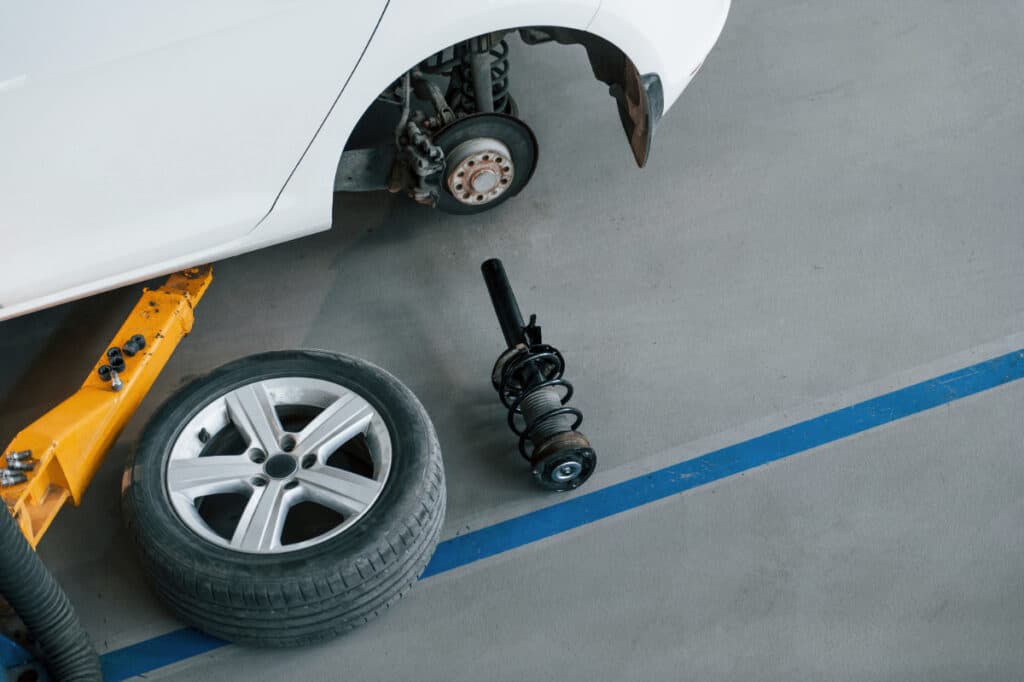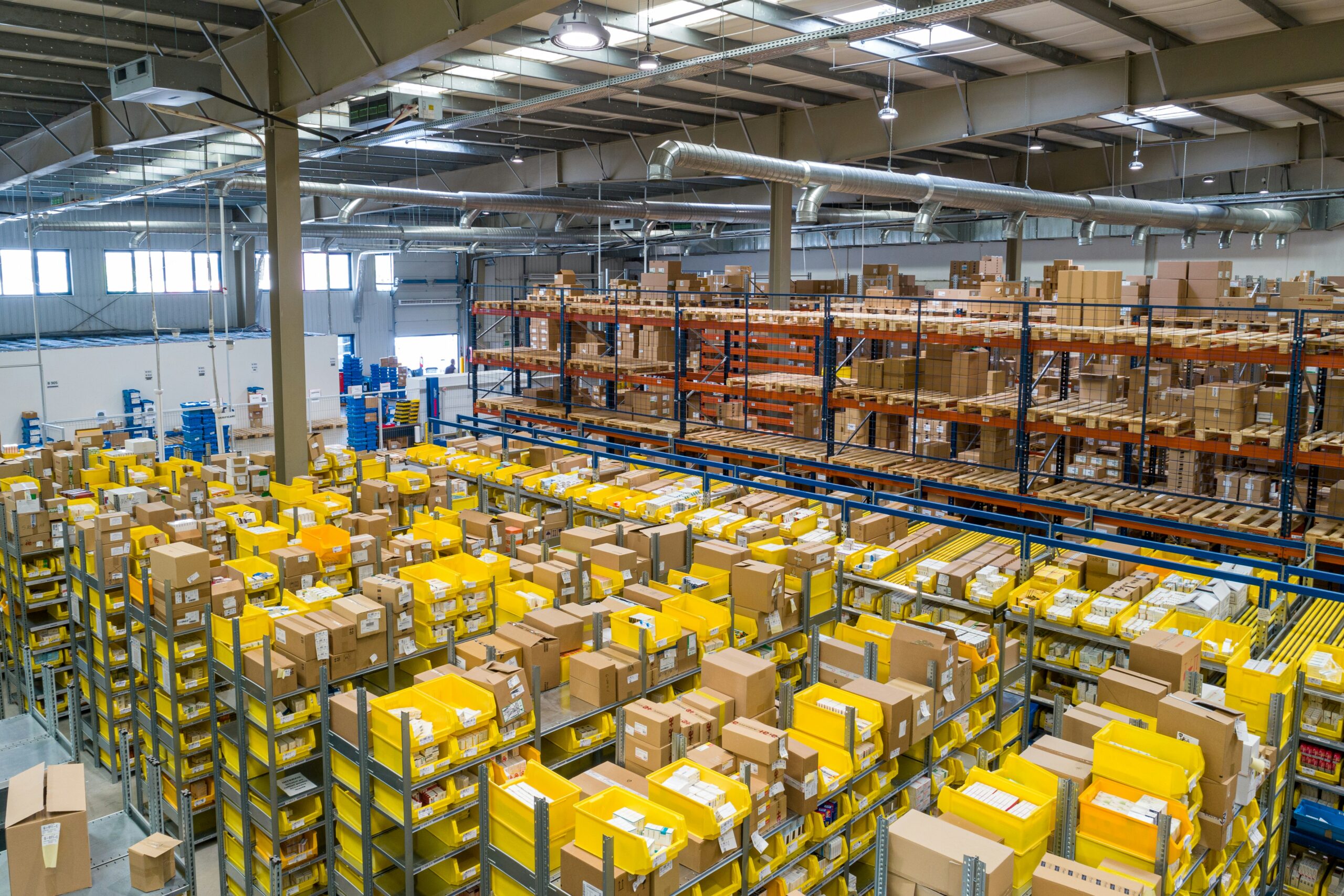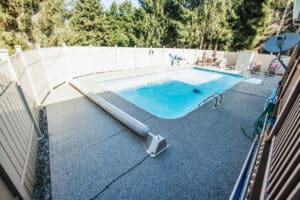Walk into almost any garage or basement we’ve coated and you’ll notice the difference right away. The concrete isn’t dusty or dull; it’s smooth, elegant, sealed tight, and easy to clean. While many people know us for our residential floor coatings, commercial concrete coatings are a common project for us too.
Warehouses, auto shops, and retail facilities are all perfect spaces for our coating systems to shine, making them look great while being easy to clean and far less expensive than more traditional options.
Let’s talk about the differences between our commercial floor coating applications and residential.
How We Handle Residential Floor Coatings
Our residential projects are all about creating durable, clean, and attractive surfaces homeowners are proud to show off. The installation process first involves grinding and repairing cracks or surface flaws in the concrete, creating a good base surface for us to build on.
We then install a polyurea base coat and polyaspartic top coat, often with decorative flakes sandwiched in between.
Why homeowners love it:
- Slip resistance makes garages and basements safer.
- Decorative flake systems produce an aesthetically pleasing finish.
- Polyaspartic technology brings better impact resistance, UV resistance, and durability compared to epoxy coatings.
Are Commercial and Residential Projects Different?
So what about commercial coatings: are they any different?
Not by much.
The same grinding and repairing steps always apply. The difference is that many of our commercial or industrial coatings then get a urethane sealant coat instead of decorative flakes and a poly topcoat. Why the difference?
Warehouse owners rarely stress about slip resistance since floors usually stay dry. What matters is durability. Floors need to withstand heavy machinery, abrasion from constant traffic, and the occasional dropped pallet. Easy cleaning is another must, as dust and debris shouldn’t slow down operations.
The biggest difference when it comes to commercial coatings is cost: some commercial or industrial facilities fall under prevailing wage requirements, which raises the price tag.
Otherwise, the installation process mirrors what we do in homes!
Our Grind-and-Seal System
For warehouses, our most common solution is grind-and-seal. Here’s how it works:
- Grind the surface clean and smooth.
- Apply two coats of urethane concrete sealer.
This flooring system is affordable, practical, and simple to maintain. Around 90% of warehouse owners go this route. It gives the protection they need without the extra cost of decorative finishes.
What Warehouse Owners Typically Want
Warehouse floors aren’t there to impress visitors, they’re built to hold up. Most owners aren’t after decorative flakes or glossy finishes. Instead, they want:
- Clear concrete sealer or a penetrating sealer.
- Protection that makes sweeping simpler.
- Dust control across large spaces.
The priority is keeping the concrete surface protected without overspending on aesthetics.
Special Challenges in Commercial Spaces
Some facilities come with quirks.
Auto shops and car dealerships, for example, often have oil-soaked or grease-stained concrete floors. Those stains can’t always be fixed by grinding alone. We use specialized products like moisture stop to pull oil and moisture out of the concrete so the coating bonds properly.
Prepping these surfaces takes more time, but it’s the only way to get long-term results.

Different Types of Concrete Coatings
There isn’t just one way to protect a concrete floor. Options include:
- Epoxy coatings: Still widely used, though not as flexible or reliable as newer systems.
- Polyurethane coatings: Offer chemical resistance, good for industrial facilities with spills or exposure.
- Polyaspartic coatings: Fast curing, highly durable, and stronger than traditional epoxy resin. Used as a top coat over polyurea.
- Concrete densifiers: A chemical reaction within the surface that creates harder, more impact-resistant floors. This is an additive during the concrete installation.
Each coating has some advantages depending on budget, use, and environment.
Our Advice for Warehouse or Retail Owners: What Really Matters for Warehouse Floors
Every commercial concrete floor benefits from sealing. Whether you choose a polyaspartic system or a straightforward grind-and-seal, what matters most is generally:
- Sealing reduces dust, even in high-traffic facilities.
- Protection against stains, spills, and wear to keep the concrete intact.
- The right coating extends the life of the floor and saves you money over time.
Residential and warehouse installations share the same process, but the priorities differ. Homeowners often value aesthetics, while warehouse managers care about practicality and protection. Either way, a sealed floor is the best bet – and we can help.
Contact us today to talk about the best concrete coating for your project and keep your floors performing at their peak.





